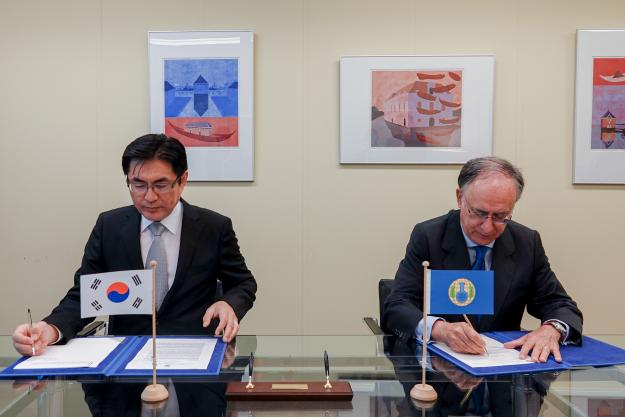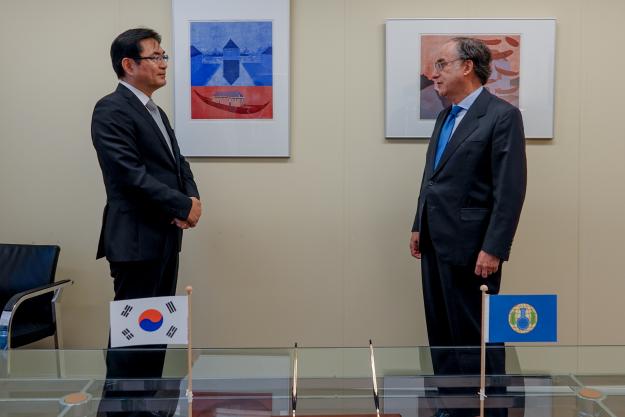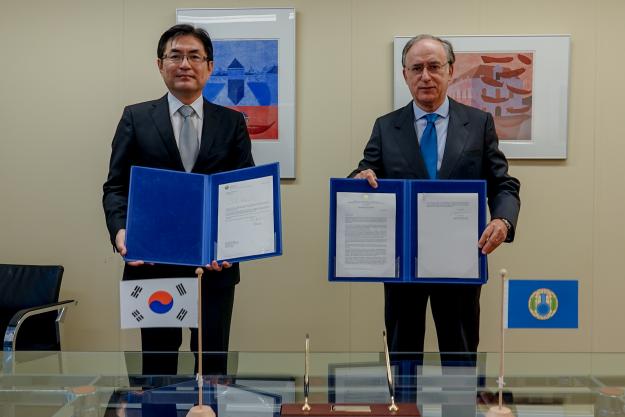
H.E. Mr Yeondoo Jeong, the Permanent Representative of the Republic of Korea to the OPCW and OPCW Director-General, H.E. Mr Fernando Arias
THE HAGUE, Netherlands–2 October 2020–The Government of the Republic of Korea has contributed a further €100,000 to a special Organisation for the Prohibition of Chemical Weapons (OPCW) Trust Fund to support the project to upgrade the current OPCW Laboratory and Equipment Store. This project will result in the construction of a new facility, the OPCW Centre for Chemistry and Technology (“ChemTech Centre”). Additionally, a €20,000 contribution will augment the OPCW’s Trust Fund for Regional Seminars to help organise the ninth edition of the workshop on the peaceful development and use of chemistry for OPCW Member States in the Asian region, to be held in Seoul later this year.
Both contributions were formalised during a ceremony between the Permanent Representative of the Republic of Korea to the OPCW, H.E. Ambassador Yeondoo Jeong, and OPCW Director-General, H.E. Mr Fernando Arias, which was held at OPCW Headquarters in The Hague.

H.E. Mr Yeondoo Jeong, the Permanent Representative of the Republic of Korea to the OPCW and OPCW Director-General, H.E. Mr Fernando Arias
Ambassador Jeong remarked: “As a staunch supporter of the work of the OPCW, the Government of the Republic of Korea believes that the Organisation and States Parties should be capable enough to adapt themselves to newly evolving challenges and threats. It is in this spirit that the Korean Government decided to continue our annual contributions to the two important undertakings: the ChemTech Centre project to upgrade the existing OPCW laboratory, and the annual Seoul Workshop to assist Asian States Parties’ efforts in their chemical safety and security management. We hope our support will contribute to strengthening the international regime against chemical weapons.”
The Director-General expressed: “This contribution brings us a step closer to making the ChemTech Centre a reality. This common endeavour of all OPCW Member States will strengthen the OPCW’s scientific and technological ability to provide additional confidence in our verification regime.”

H.E. Mr Yeondoo Jeong, the Permanent Representative of the Republic of Korea to the OPCW and OPCW Director-General, H.E. Mr Fernando Arias
Director-General Arias appealed to all OPCW Member States in a position to make voluntary contributions to do so. He further emphasised the important role the new ChemTech Centre will play in strengthening the OPCW’s ability to address chemical weapon threats and enhance capacity building activities. He highlighted that “all contributions, regardless of size, are greatly appreciated”.
So far, 43 Member States, Israel – a signatory state – and the European Union have contributed or pledged to contribute financially to the ChemTech Centre project, and a considerable amount has been raised to date.
Background
The project to build the ChemTech Centre is on-going and seeks to strengthen the OPCW’s capabilities to fully address new and emerging chemical weapons threats, as well as to support capacity building in OPCW Member States. The current OPCW Laboratory and Equipment Store are central to the effectiveness and integrity of the verification regime of the Chemical Weapons Convention, and they also contribute to the OPCW’s capacity-building and international cooperation activities. However, the current facility will soon no longer be fit-for-purpose due to its ageing infrastructure, space constraints, larger workloads, and new missions with new areas of work.
A new facility is required to meet the demands of OPCW Member States for enhanced verification tools, improved detection capabilities and response measures, as well as increased capacity-building activities. The ChemTech Centre will also help the OPCW to keep pace with developments in science and technology and new chemical weapons threats. The OPCW Technical Secretariat is developing a detailed project plan for the construction of the ChemTech Centre, and a Trust Fund for voluntary contributions has been established to secure the required resources for the project.
To date, the following Member States have contributed or pledged to contribute to the project: Algeria, Andorra, Angola, Australia, Bangladesh, Belgium, Canada, Chile, China, Cyprus, Czech Republic, Estonia, Finland, France, Germany, Greece, Hungary, Indonesia, Ireland, Italy, Japan, Kazakhstan, Luxembourg, Malaysia, Morocco, the Netherlands, New Zealand, Pakistan, Peru, Poland, Portugal, the Republic of Korea, Romania, Slovakia, Slovenia, Spain, Sweden, Switzerland, Thailand, Turkey, United Arab Emirates, United Kingdom of Great Britain and Northern Ireland, and the United States of America. The European Union, Israel and other donors have also contributed.
As the implementing body for the Chemical Weapons Convention, the OPCW, with its 193 Members, oversees the global endeavour to permanently eliminate chemical weapons. Since the Convention’s entry into force in 1997, it is the most successful disarmament treaty eliminating an entire class of weapons of mass destruction.
Over 98% of all chemical weapon stockpiles declared by possessor States have been destroyed under OPCW verification. For its extensive efforts in eliminating chemical weapons, the OPCW received the 2013 Nobel Peace Prize.
